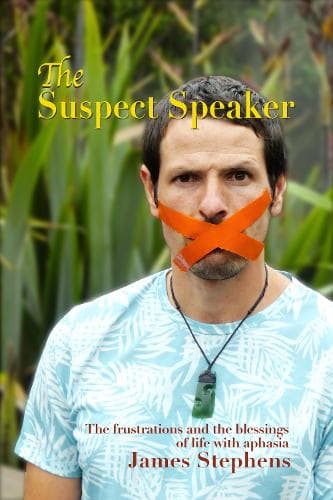
The: Suspect Speaker
Find your copy...
The Suspect Speaker There are fifteen short short stories in this volume. All the stories are about people who have difficulty in verbal communication. People with aphasia. Aphasia is the loss of a previously held ability to articulate ideas or comprehend spoken or written language, resulting from damage to the brain caused by injury or disease. These stories contain a taste, an inkling, of what it is to have aphasia: the frustrations, the anger, the acceptance and the blessings. People with aphasia have individual communication difficulties: Some can’t read very well, or their attention span is fatigued. Some have lost some vision. Some can’t write but their vocabulary is adult. Some can’t find the sense in syntax, or they lack context or comprehension. Most understand the words, but can’t pronounce them. Each story here has three versions: A, B and C. The A version is for people who have aphasia that have difficulty in reading. The sentences are compact and descriptions are sparse. The C versions is for people with aphasia who can read, or who like to be read to, by their supporters/carers. The B versions are in-between – a therapeutic ‘sandwich’. People who have aphasia can get the gist of the stories from the A version, and in recovery, over time, can extend their reading ability for the B or C stories.
About the Author
James Stephens James is a New Zealander. He was a teacher, musician and music director, a journalist and event manager – as well as a husband, father and grandfather. He was a voracious reader, a fluent writer and confident speaker. In 2015, he suffered a hemiparesis, a middle cerebral artery territory infarct. In a word, a stroke. He collapsed, paralysed on his right side, and couldn’t speak or write. The hospital intervention was rapid and his limbs were free but his speech was absent. He had/has aphasia. Aphasia is the loss of a previously held ability to articulate ideas or comprehend spoken or written language, resulting from damage to the brain caused by injury or disease – in this case, a stroke. With expert therapists in speech, music and eurhythmy he has re-invented himself. He has a positive and optimistic outlook, electing to view his stroke as a ‘stroke of luck’. “My aphasia forced me to look at my life differently. My expected biography has changed. Now, I am an author – apparently.” email: james.stephens.dms@gmail.com facebook: https://bit.ly/3bH6kZr





